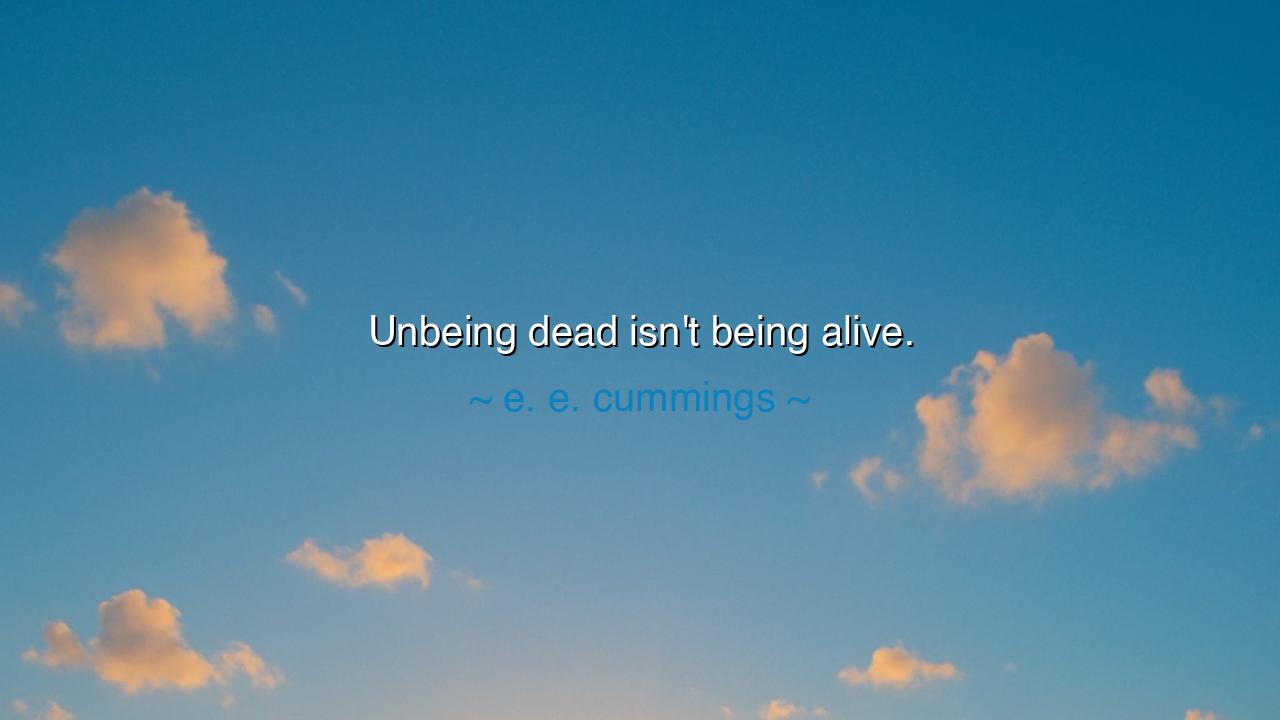
Unbeing dead isn't being alive.






“Unbeing dead isn’t being alive.” Thus wrote e. e. cummings, the poet of paradox and heart, who spoke in whispers that could shake mountains. In these few words, he gave voice to one of the oldest truths known to humankind: that mere existence is not life, that to breathe without passion, to walk without wonder, to live without love, is but another form of death. To “unbe dead,” as he said, is simply to continue—the body moving, the clock ticking, the shadow cast upon the ground—but to be alive is something far greater, rarer, and more sacred. It is to awaken the soul, to feel the pulse of creation in one’s own veins, to burn brightly while one yet breathes.
The origin of these words lies deep in the spirit of cummings himself, a man who rebelled against the dull machinery of conformity. He saw that too many men and women existed like ghosts—alive in flesh, but dead in feeling. They followed rules without question, repeated words without meaning, and mistook comfort for joy. Against this lifeless current, cummings raised his voice like a songbird breaking the silence of dawn. His poetry called men back to authentic living, to spontaneity, love, and beauty. He was reminding us that to truly live is to feel deeply, even at the cost of pain, for numbness, not death, is the true enemy of the human soul.
The ancients knew this truth well. The Stoics taught that the man who drifts through life without purpose is no better than a corpse that has forgotten to fall. The mystics of every age have said the same in their own tongues: life without awareness is but a shadow of life. The Egyptians spoke of the “second death,” the death of the heart before the death of the body. And the Greeks, in their myths, told of shades who wandered the underworld—souls who once lived, yet never truly awakened to living. Cummings’s line carries their same wisdom, distilled into the language of the modern age: it is not enough to be free from death; one must also be free from apathy, fear, and habit, for these are prisons as deep as the grave.
Consider the story of Helen Keller, who, though struck blind and deaf in infancy, refused to let her body’s limits become her spirit’s grave. She could have spent her years in the half-light of mere existence, a prisoner of silence. Yet through courage, learning, and the touch of human love, she awakened to a life richer than most who can see or hear. She once said, “Life is either a daring adventure or nothing.” In her, we see the embodiment of Cummings’s truth: to be alive is to participate, to strive, to love—to dare to feel the fire of existence, even through the pain it brings.
But how many, even today, drift through their days in the stupor of routine? They wake, work, eat, sleep—and call it life. They silence their dreams in the name of practicality, choke their passions for the sake of acceptance, and live cautiously, fearing the risks that true aliveness demands. Such souls, Cummings might say, have escaped death but not found life. They are the living dead, caught in the gray space between being and unbeing. To them, his words are a call to rise—to remember that the purpose of life is not endurance, but expression; not survival, but creation.
To be alive, then, is to be in constant dialogue with wonder—to see the world not as habit, but as miracle. It is to risk heartbreak for the sake of love, to stumble in pursuit of truth, to laugh even when the world is cruel. It is to awaken each morning with the sense that something divine still moves within you, urging you to grow, to give, to see. This aliveness is not measured in years or possessions, but in the depth of feeling and the courage to live truthfully. It is not an easy path, but it is the only one worth walking.
So, my child of breath and bone, take this wisdom into your heart: do not mistake motion for meaning, or survival for living. Let your days not be filled with mere endurance, but with awareness. Seek what stirs your soul, even if it frightens you. Speak words that are true, even when they tremble on your tongue. Love boldly, forgive freely, and look upon the world with eyes of astonishment. For one day your body shall indeed return to the earth—but until then, make sure that you are not merely “unbeing dead,” but gloriously, fiercely alive.
Thus let the voice of Cummings echo through your spirit: life is not a condition—it is a creation. To exist is to pass through time; to live is to fill it with light. Do not wait for life to happen to you—become life itself. In that awakening, death will lose its power, and every breath will become a hymn of being truly, radiantly, and eternally alive.






AAdministratorAdministrator
Welcome, honored guests. Please leave a comment, we will respond soon